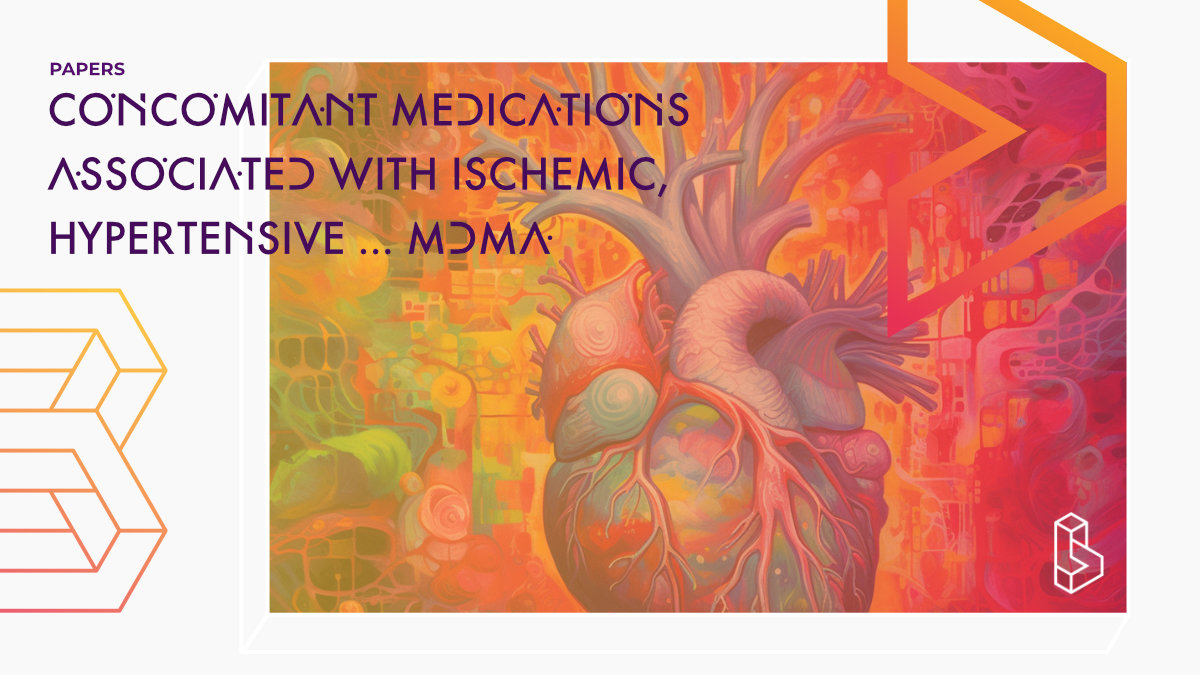This survey (n=17) investigates cardiovascular adverse events (AEs) associated with MDMA-assisted therapy sessions, utilizing the FDA Adverse Event Reporting System. The study finds that all cases of cardiovascular AEs involved using additional substances alongside MDMA, all of which had been previously associated with cardiovascular AEs. MDMA was not marked as the primary suspect in any of the reports.
Abstract of Concomitant medications associated with ischemic, hypertensive, and arrhythmic events in MDMA users in FDA adverse event reporting system
“3,4-Methylenedioxymethamphetamine (MDMA) is currently being investigated as an adjunctive treatment to therapy for posttraumatic stress and other anxiety related disorders in clinical trials. Within the next few years MDMA-assisted therapy is projected for approval by regulatory authorities. MDMA’s primary mechanism of action includes modulation of monoamine signaling by increasing release and inhibiting reuptake of serotonin, norepinephrine, and, to a lesser extent, dopamine. This pharmacology affects sympathomimetic physiology. In controlled trials, special attention has been given to cardiovascular adverse events (AEs), because transient increases in heart rate and blood pressure have been observed during the MDMA-assisted therapy sessions. Finding and quantifying the potential drivers of cardiac AEs in clinical trials is difficult since only a relatively small number of participants have been included in these studies, and a limited set of allowed concomitant drugs has been studied. In this study a more diverse set of reports from the FDA Adverse Event Reporting System was surveyed. We found 17 cases of cardiovascular AEs, in which the individuals had taken one or more substances in addition to MDMA. Interestingly, all of those concomitant medications and illicit substances, including opioids, stimulants, anticholinergics, and amphetamines, had been previously associated with cardiovascular AEs. Furthermore, in none of the reports MDMA was marked as the primary suspect.”
Authors: Tigran Makunts, Diane Dahill, Lisa Jerome, Alberdina de Boer & Ruben Abagyan
Summary of Concomitant medications associated with ischemic, hypertensive, and arrhythmic events in MDMA users in FDA adverse event reporting system
MDMA is a schedule I controlled substance in the United States and the European Union, and a Class A substance in the United Kingdom. It is effective in treating post-traumatic stress disorder (PTSD) but may also cause cardiovascular adverse events.
Considering the polypharmacy often present in PTSD populations, further MDMA AE evaluation is warranted using the FAERS database.
In this study, arrhythmic, ischemic, and hypertensive adverse events were reported in MDMA users. The contribution of concomitant drugs and substances was evaluated.
Find this paper
https://doi.org/10.3389/fpsyt.2023.1149766
Open Access | Google Scholar | Backup | 🕊
Cite this paper (APA)
Makunts, T., Dahill, D., Jerome, L., de Boer, A., & Abagyan, R. (2023). Concomitant medications associated with ischemic, hypertensive, and arrhythmic events in MDMA users in FDA Adverse Event Reporting System. Frontiers in Psychiatry, 14, 812.

